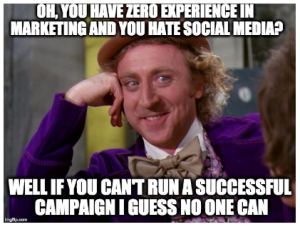You’ve got two engineers, a cool co-working space, a product in the works, angel funding, and a registered company name. Congrats! You’ve done a bunch of productive stuff, but it’s not enough to introduce your company to the world.
There are several fundamental steps you need to do before consulting a PR agency for the launch of your product or service. There is a common misalignment in a startup’s timeline, where the founder feels they need to get media attention for their half developed idea first, then raise more funding to complete the world’s greatest product.
Sorry friends, it’s the other way around – you need to develop a working prototype before letting your freak flag fly in the media – otherwise you’ll spend a lot of cheddar building a product with features nobody needs.
Some startups tend to think first about how they can scale their idea before they have a working product. But let’s say you spend $200 on Facebook ads, get some downloads – but your app is buggy, or has a three second loading time – that’s an automatic uninstall. Figure out first if it can be used and sold before spending tons of cash on it.
There’s only one chance to launch, so before calling up a PR company and selecting the fillings of your mini sandwiches for media, make sure you have the following, in this order.
1x solid MVP
The MVP (minimum viable product) is a working product with core features, let’s say version 1.0 of your product that lets you gain insight as to whether the world actually needs it. There’s no purpose in spending your savings building the Uber App if you don’t develop a functional “driver” account that makes you scale the adoption among drivers.
20 x friends
Well, they could just be colleagues or neighbours – individuals who will not blast you on social media if the product is buggy. You need at least 20 people who are using the MVP and are willing to give you feedback. Here you need to ask, do people love it? Do they need it? Will this gain traction? Will they trash if after five uses? You need to build a product that can gain traction before scaling.
Feedback
It’s better to do repairs or a pivot BEFORE you launch than after you launch. A company that has an identity crisis doesn’t look good to the media. Once you have some local users, this is the opportunity to do some A/B testing, improve on the UX, and even at this early stage you still have resources to pivot if you realise no one needs blue tooth dog collars. Now ask, is it going to be scalable?
[Spoiler alert Silicon Valley S3]: You don’t want to end up like Richard when Jack Barker’s cuts up Pied Piper to make it easier to sell via the ‘Conjoined Triangles of Success’ to make it more profitable.10x pieces of good content
Let’s say you’ve launched early and the media are flooding to your Facebook page. But umm, there isn’t anything on here except 1 post from your mom that says ‘I’m proud of you!’ Have someone create content on your company website just to show that you are truly interested in the issue you’re solving.
5 x brand ambassadors
We don’t mean the tanned and toned Instagram influencer who holds ANYTHING for $500 a post, we mean a real human being who truly LOVES your idea and product. If you have social friends who are ranting and raving with one another about your idea, then it brings some legitimacy to your product. An enthusiastic brand ambassador is worth more than any advertisement at this point.
1x small community
Once you have some people who love your product or service, it’s enough to start a community. This can just be a minimum of ten people who are talking about your dope product online. Successful startups have kicked off because there was a community around an already existing common issue: ‘Jon realised he couldn’t get meatloaf online, ‘til he met Peter and Jim who also wanted to digitise the meatloaf industry’.
People might not know they need your specific product, but if they meet other people who love it, they might realise they have been missing your product their whole life.
Always remember to start small, very very small. Do that small thing very well and invest in making it better for your fans. Only then can you grow and improve. This will reduce the amount of money wasted on building and selling a product that nobody wants.
Get in touch with us at [email protected].
This article was first published in Tech in Asia on 11th May 2016

